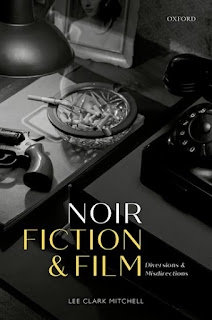 Director of the Program in American Studies. He teaches courses in American literature and film, with recent essays focusing on Cormac McCarthy, John Williams, the Coen brothers, and Edith Wharton. His recent books include Mere Reading: The Poetics of Wonder in Modern American Novels (2017), Late Westerns: The Persistence of a Genre (2018), and More Time: Contemporary Short Stories and Late Styles (2018).
Director of the Program in American Studies. He teaches courses in American literature and film, with recent essays focusing on Cormac McCarthy, John Williams, the Coen brothers, and Edith Wharton. His recent books include Mere Reading: The Poetics of Wonder in Modern American Novels (2017), Late Westerns: The Persistence of a Genre (2018), and More Time: Contemporary Short Stories and Late Styles (2018).
Mitchell applied the “Page 99 Test” to his new book, Noir Fiction and Film: Diversions and Misdirections, and reported the following:
Joseph Addison notoriously observed that “even a stopped clock is right twice a day.” Ford Madox Ford’s less obvious quip is a tad slippier, though it exactly fits my book in the serendipity of a ninety-ninth page that opens the book’s middle chapter (squarely fourth out of seven). There, as it happens, I pause over my larger thesis to introduce its further unfolding in the chapters to follow. Indeed, as I’m surprised to discover, one could hardly find a better review (save for the book’s Introduction) of my counterintuitive argument about noir fiction and film: that it appeals as a genre more for its descriptive diversions than for its eruptive plot machinations. However fitfully fascinating, noir antagonists lure us on via fleeting gestures rather than force of personality. As page 99 declares, “Compelling as these characters may be as characters, they remain to a large extent blank slates, free of invigorating hobbies or importunate wives, stripped of scarred histories and lofty aspirations. They lack either pasts or futures that press on them in significant ways, or otherwise impede their efforts to solve the crime at hand.”Learn more about Noir Fiction and Film at the Oxford University Press website.
Not only do I here recapitulate that argument, but extend it, “from the various forms in which description serves as deflection and delay; to heroes as stick figures inclined to lively dialogue and presumptive ‘attitudes’ rather than establishing their presence as psychologically integrated characters; finally, to the idea that detectives can hardly be known at all, or made readily recognizable in a clear-cut way.” The presumptive middle of my discussion here encapsulates the whole, with Noir Fiction and Film categorically passing the Page 99 Test. But in leafing through my other monographs in hopes of further confirmation (that I’m truly a Page 99 kind of author), I am hard-pressed to detect any other clear passes, even near-misses. The stopped clock simply stopped in my favor this time round, making me suspect that this book may have been chosen for this test by someone who had already turned the page.
--Marshal Zeringue



